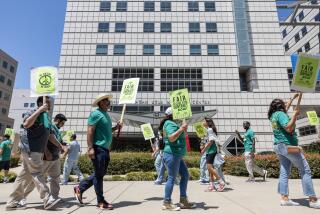Hunger Strikers Feel It in Their Guts
A motor home is parked off Paxton Street with a blue tarp stretched above the sidewalk for shade. Here on the edge of the Price Pfister factory in Pacoima, three protesters continued a hunger strike Monday as dozens of supporters hoisted signs complaining about jobs being shipped south of the border.
It is a bilingual protest, and the irony is lost on no one.
“Exporta Productos Americanos,
No Los Trabajos Americanos!”
Or, for those who struggled in Beginning Spanish:
“Export American Products,
Not American Jobs!”
Ironic as hell, says Alejandra Torres. Monday, she says, was her 12th day on a diet of only juice and water. Now the plan is that someone will take her place on Wednesday.
Twenty-two years ago, she was a teenage bride who accompanied her husband in the well-worn path from Mexico to Los Angeles in search of work. Three years ago, Torres, now 39, became a naturalized United States citizen. Now there is a sense of abandonment as she and others protest for nothing more than a better severance package.
How is Torres feeling?
“Dizzy,” the stout woman says. “Headaches. Hungry.”
It has been an unusual protest, this huelga de hambre, or “strike of hunger.” Rather than having a grand social goal, such as ending apartheid or justice for political prisoners, the demonstration is aimed at doubling a severance package for workers who have been laid off. Price Pfister is offering a half-week of pay and a half-week of health benefits for every year of service, up to 27 years. The protesters want to make it a full week of pay and health benefits for every year of service, up to 30 years.
Felix Hernandez, a Teamsters union organizer working with the protesters, said he initially opposed the tactic because a better severance package wasn’t worth jeopardizing anybody’s health. On Saturday, hunger striker Victoria Sevilla, 40, collapsed with abdominal pains and required treatment at Olive View-UCLA Medical Center. She was treated and released.
There were more discussions Monday, but Hernandez emerged with only bad news. Company officials, he said, had informed him that between 300 and 400 workers would be laid off by Jan. 1. That would more than double the number who lost jobs since layoffs began nine months ago. (Sam Wheeler, Price Pfister vice president, declined to comment on Hernandez’s statements.)
The vast majority of the workers holding protest signs were Latino. Hernandez addressed the workers in Spanish. No one seemed surprised by the news; some said they fear that in time, all the jobs will be shipped to Mexico.
“I’ve been working here 27 years,” said Julia Ortega, who was born not in Mexico or El Salvador, but Texas. “And I’m pretty sure I’m going to get laid off.”
After 27 years, she feels that 27 weeks of pay and 27 weeks of health benefits wouldn’t be asking too much. For that reason, Ortega says, she is grateful to Torres and others who are refusing to eat.
This is not a conventional demonstration for better pay or working conditions; nobody hears taunts of “scab.” The term “strike” is something of a misnomer--nobody has walked off the job. Ortega and others dutifully show up for work--and when their shift ends, they pick up the protest signs.
With work going south, they don’t have much leverage. In their shoes, would you walk off the job in protest? Torres and Ortega complain that their local union leadership was ineffective, inspiring a rift between the rank-and-file and shop stewards. Hernandez acknowledges that this “slight division” brought him into the picture.
Although he was initially skeptical about the tactic, Hernandez says, he now understands the workers’ desire to take a strong moral stand--to conduct a graphic demonstration against what they consider the company’s unfairness.
And Hernandez urges workers to remember that this isn’t just a protest against Price Pfister or its parent company, Black & Decker. The larger culprit here, he says, is the North American Free Trade Agreement. Rightly or wrongly, NAFTA is the boogeyman of the American labor movement.
“This is a fight for American workers in general,” he declares.
When Hernandez says this, it sounds a little like a voice in the wilderness. Are people paying attention?
Media interest in the Price Pfister protest has been relatively modest. Three years ago, UCLA students who staged a hunger strike in the quest for an expansion of Chicano studies received more attention. The UCLA hunger strikers won some concessions. Then again, that escalation of campus culture wars no doubt helped stir the backlash represented by Proposition 187 in 1994 and Proposition 209 this year.
There are both differences and parallels between the two protests. At UCLA, it was very much a battle over an idea. At Price Pfister, the question of the severance package seems not at all ethereal.
But these protesters say that this is also a cause of social justice. Torres had worked as an assembler at the plant for six years before tendinitis and four surgeries put her on workers’ comp and disability. The severance package doesn’t affect her, but she says she felt compelled to join the hunger protest “for my people.”
“A lot of people have mortgages to pay,” she said. “A lot have children in college.”
Would this drama get more attention if it were less ironic? Would fewer Americans shrug if this weren’t so much a saga of immigrants from south of the border losing jobs to people who stayed south of the border? Torres, a naturalized American, says she hopes her four children will learn, by her example, the necessity of fighting for their rights.
Inside Price Pfister, there is some skepticism about the hunger strike. “The roach coach comes by every two hours,” one worker scoffed.
Torres says she doesn’t let such talk bother her. “I’m doing this by my spirit,” she said. “I offer my sacrifice to God.”
Scott Harris’ column appears Tuesdays, Thursdays and Sundays. Readers may write to Harris at the Times Valley Edition, 20000 Prairie St., Chatsworth 91311. Please include a phone number.
Would fewer Americans shrug if this weren’t so much a saga of immigrants from south of the border losing jobs to people who stayed south of the border?
More to Read
Sign up for Essential California
The most important California stories and recommendations in your inbox every morning.
You may occasionally receive promotional content from the Los Angeles Times.










